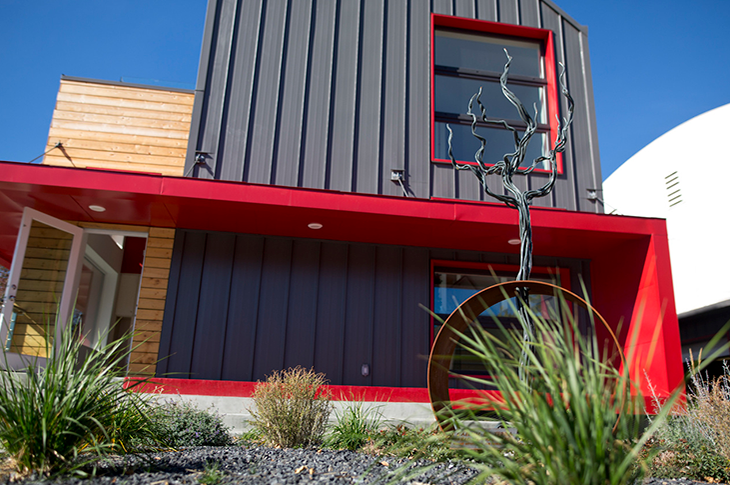SAIT joins institutions across Canada to form Canadian Colleges for a Resilient Recovery

SAIT is joining forces with a group of colleges, polytechnics and cégeps from across the country to educate a post-pandemic workforce in support of a new climate-focused economic recovery.
The Canadian Colleges for a Resilient Recovery (C2R2) will champion projects to support an economic recovery that delivers good jobs, is positive for the environment and addresses socio-economic inequality.
“By aligning with institutional environmental leaders across the country, we have the advantage of shared experiences and shared intellect,” says Dr. David Ross, SAIT President and CEO. “Our applied researchers, industry partners and students will benefit from the collective commitment and impact of this group driving recovery initiatives, including climate-focused research.”
The group was formed to take meaningful action as a direct response to five bold moves and 22 recommendations of the Task Force for a Resilient Recovery, which recommended a $50-billion strategy for a green recovery in Canada that will support long-term jobs and economic growth, and keep Canada competitive in the quickly-evolving global marketplace.
Recently, the federal government indicated climate action will be a cornerstone of their plan to support and create one million jobs across the country.
“This collaboration is in direct alignment with objectives in SAIT’s strategic plan, New World. New Thinking.,” says Dr. Ross. “SAIT is well positioned to partner with industry to drive innovation and deliver the skills training needed for the jobs of the future and for our country’s sustainable economic recovery.”
By rapidly training workers to meet skills gaps, reviving and developing Canadian businesses through applied research solutions, and serving as living labs for climate change solutions, the C2R2 coalition aims to help the Canadian economy build back better.
“Without a skilled Canadian workforce, the jobs of the clean economy will go to other countries,” said Richard Florizone, President and CEO of the International Institute for Sustainable Development, and Chair of the Task Force for a Resilient Recovery. “Through programs like C2R2, we can make sure it’s Canadians who benefit from the jobs and growth of a cleaner, more resilient economy.”
Sustainability leadership and innovation at SAIT
As Calgary's first commercial net-zero building, the Green Building Technologies (GBT) Lab and Demonstration Centre at SAIT integrates construction, green technologies and renewable energy.
Now, the GBT research team has partnered with Woodpecker European Timber Framing and an Alberta family to construct a one-of-a-kind home — “The Confluence” — in the foothills of southern Alberta. The project is targeting the gold standard in green building construction — certification through the Living Building Challenge (LBC) — and will be a net-zero water and net-positive energy building.
GBT is one of several environment-based research areas and facilities under the umbrella of SAIT’s Applied Research and Innovation Services (ARIS).
“The project demonstrates it’s actually possible to create a building this sustainable,” says Melanie Ross, Research Manager, GBT. “It also highlights the importance of partnering with industry to find solutions and advance sustainability with a focus on the future.
“That kind of industry transformation through collaboration is our core mandate in GBT and throughout ARIS.”
ARIS researchers are also part of a $2-million research collaboration focused on contributing improved energy and environmental solutions to oilsands operations, and are working with Katal Energy on a project to improve their “hydro-refining” process — adding water to diesel fuel to make it go farther and burn cleaner.
Students in programs across SAIT have the opportunity to apply their learnings in various industry sectors through applied research — 19 SAIT students took part in the LBC project — and capstone projects. Integrated Water Management student Jaime Marquez is assessing ways to reduce the impact from Imperial’s Cold Lake operations on nearby plants and wetlands, and support future land reclamation efforts as part of an Imperial-sponsored capstone project at SAIT.
The partner you want. The solutions you need.
ARIS develops new or improved technologies in response to the innovation needs of industry — connect with our experts in ARIS. Plus, our International Corporate Training and Client Development can bring ARIS innovation anywhere in the world.
Upcoming C2R2 webinars
Learn more about how colleges, polytechnics and cégeps nationwide can lead the resilient recovery and support a climate-ready Canada.
📅 Hollywood North 2.0: How Digital Transformation has Canada Poised to Take Centre Stage
Hosted by Seneca College
Thursday, May 13
📅 Rebuild: Supporting the Transformation to Zero Carbon Buildings
Hosted by Mohawk College
Thursday, June 10
Industry Driven
We prepare students for successful careers and lives.
SAIT'S
2020-2025
Strategic plan

Oki, Âba wathtech, Danit'ada, Tawnshi, Hello.
SAIT is located on the traditional territories of the Niitsitapi (Blackfoot) and the people of Treaty 7 which includes the Siksika, the Piikani, the Kainai, the Tsuut’ina and the Îyârhe Nakoda of Bearspaw, Chiniki and Goodstoney.
We are situated in an area the Blackfoot tribes traditionally called Moh’kinsstis, where the Bow River meets the Elbow River. We now call it the city of Calgary, which is also home to the Métis Nation of Alberta.